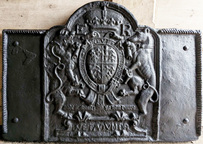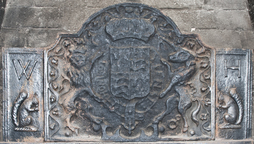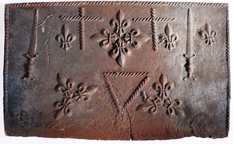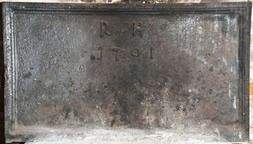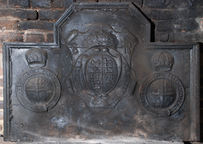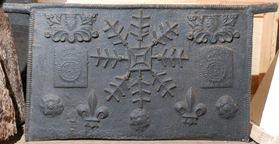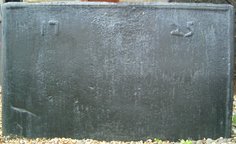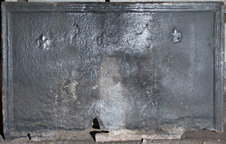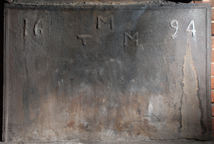-
1288
Description: Arched rectangular shape with rounded corners; ovolo within fillet moulding all round; oval Tudor royal shield with garter surrounding, topped with a royal crown; dragon and greyhound supporters; initials split by crown; inscription on a fillet between legs of supporters, behind garter finial; motto on an Ionic plinth at bottom; two rectangular side panels with twisted rope edging top and side.
Notes: The supporters are those of Henry VII or Henry VIII, but the initials suggest the fireback dates from the reign of Edward VI (1547-53). John Harvo (d. c1565) was a gunfounder who has been identified as occupying Pounsley furnace, Framfield, Sussex, possibly from as early as 1547; the fireback may have been cast originally during the reign of Henry VIII (1509-47), with the initials added to an early casting using the original pattern. The detail on the armorial back is good, showing little wear, so the casting was probably made not long after the original armorial fireback. The rivets are modern.
Inscription: E R / HONY SOIT QVE MAL Y PAYNCE / Made in Sussex by John Harvo / DV ET MOVN DROI
Arms: Tudor royal - Probably Henry VIII
- Decoration tags:
- rectangular with round arch (shape)
- rope (edging)
- simple stamps
- whole carved pattern
- heraldic
- armorial
Manufactured: in the mid- to late-16th century in the Weald area of England.
Current location: not known.
- Attached to series:
- John Harvo series
- Pounsley series
-
1244
Description: Cavetto-canted arched rectangular shape with rectangular extension panels; cavetto-moulded edging, with astragal on wide fillet edging on the extension panels; central panel, crown, shield and Garter of the Tudor royal arms but with crowned lion and unicorn supporters, all within an undulating vine border; extension panels comprise a single letter (W on left, H on right) above an inward-facing seated squirrel.
Notes: The royal arms are a hybrid of the Tudor and Stuart achievement, quite crudely modelled. The initials and squirrels both relate to the Holte family who lived at Aston Hall, which was built between 1618 and 1623. The difference in the condition of the armorial and the extensions suggest that the armorial was significantly older than the extensions. The bottom 190mm of the fireback is concealed below, behind the grate placed in front of it.
Inscription: W / HONY SOIT QUI MAL Y PENSE / H
Arms: English Tudor royal with Stuart lion and unicorn supporters
- Decoration tags:
- rectangular with canted top corners and round arch (shape)
- cavetto (edging)
- carved stamps
- carved pattern panels
- extension panels
- heraldic
- armorial
- royal
- text
- animals
Manufactured: in the mid- to late-17th century in England.
Current location: Aston Hall, Aston, West Midlands, England.
(part of the Birmingham Museums Trust museum group)
- Attached to series:
- Stuart royal armorial firebacks
-
1219
Description: Rectangular shape; twisted rope edging (top and sides); top centre, cross-shaped arrangement of four fleurs-de-lys between to crosses formed of lengths of twisted rope with single fleurs outside and beyond each of them a dagger, point upwards; to the right, a single fleur; bottom centre, a triangle formed of three lengths of twisted rope, vertex to the bottom, between two non-identical groups of three fleurs arranged in star pattern.
Notes: The style of the fleurs-de-lys associates this fireback with a series with several examples. The dagger type (approximate length 32cm) is different to others in the same series. Bishop & Miller Auctioneers, Stowmarket, 27 Jan 2022, lot 88 (£110).
- Decoration tags:
- rectangular (shape)
- rope (edging)
- simple stamps
- carved stamps
- heraldic
- apotropaic
- objects
Manufactured: in the mid- to late-16th century in the Weald area of England.
Current location: not known.
- Attached to series:
- Royal series
- Knife & Dagger stamp firebacks
- Fleur-de-lys firebacks
-
1282
Description: Rectangular shape; wide fillet and ogee-moulded edging; approximately top centre, initials RH, with date 1701 centred below.
Notes: The character set for the initials and date lacks uniformity, some carved crudely, others more carefully; the lettering differs from another fireback (see no. 1166), with the same initials and date, by the position and shape of the letter 'R'. Formerly at Nethercote, Netherfield Hill, East Sussex. The former location in the Netherfield area of these two firebacks suggests a possible association with Richard Hay, owner of land in that area at that time and ironmaster at Beech Furnace nearby.
Inscription: R H / 1701
- Decoration tags:
- rectangular (shape)
- fillet and ogee (edging)
- carved stamps
- individual letters
- individual numbers
- text
Manufactured: in 1701 possibly at Beech Furnace, Battle in the Weald area of England.
Current location: in private hands, Catsfield, East Sussex, England.
- Attached to series:
- Date & initials firebacks
-
260
Description: Quasi-arched rectangular shape, with 5-facetted arch; cyma recta moulded edge; oval Tudor royal shield on a cartouche surrounded by a garter, a crown above separating the initials, ER, all on a larger cartouche; on either side a circular Tudor royal shield within a garter, with a crown above each.
Notes: The word ‘PENSE’ in the garter mottoes is differently spelled on the central stamp — ‘PENCE’ - and the outer stamps — ‘PANSE’ (where the ‘N’ is reversed). The outer stamp has been noted on three firebacks dated 1589. Three horizontal planklines on central cartouche.
Copies of this fireback are known.
Inscription: ER [and Garter mottoes]
Arms: Tudor royal
- Decoration tags:
- rectangular with five-facetted arch (shape)
- cyma recta (edging)
- carved stamps
- carved pattern panels
- planklines
- armorial
- royal
- text
Manufactured: in the late-16th century in the Weald area of England.
Current location: in private hands, Chiddingstone, Kent, England.
- Attached to series:
- 1589 series
- Tudor royal armorial firebacks
-
131
Description: Rectangular with lifting handles; twisted rope edging (top and sides); elaborate central rope design of concentric squares with eight symmetrical arms each with six branches; two crowned rose en soleil stamps left and right centre; three roses across the bottom interspersed with two fleurs de lys; in top corners, two carved furniture-derived stamps. The width of the main plate is 876mm.
Notes: The rose-en-soleil was the badge of King Edward IV and, thus, a Yorkist symbol. The individual stamps are to be seen, separately or together, on other firebacks, indicating a common source; lifting handles are infrequently encountered on firebacks. The elaborate central rope array may be an interpretation of the escarbuncle, which was the principal heraldic charge on the arms of the Duchy of Cleves (1515-57), possibly associating this fireback with the brief marriage of Henry VIII and Anne of Cleves. Formerly part of the Ade Collection (from Grove Hill, Hellingly, Sussex).
- Decoration tags:
- rectangular (shape)
- rope (edging)
- simple stamps
- carved stamps
- lifting handles
- heraldic
- architectural
- objects
Manufactured: in the mid- to late-16th century possibly at Pounsley Furnace, Framfield in the Weald area of England.
Current location: Hastings Museum and Art Gallery, John's Place, Bohemia Road, Hastings, East Sussex, England.
Museum number: HASMG: 1952.51.44 (part of the Hastings Museum museum group)
-
616
Description: Rectangular; ovolo-moulded edging (top and sides); date (in two parts) split across upper part of plate.
Notes: A recasting
Inscription: 17 25
- Decoration tags:
- rectangular (shape)
- ovolo (edging)
- individual numbers
- text
Manufactured: in 1725 possibly in the Weald area of England.
Current location: Mark Ripley Forge & Fireplaces, Northbridge Street, Robertsbridge, East Sussex, England.
- Attached to series:
- Date only firebacks
-
1283
Description: Rectangular shape; ogee-moulded edging; upper centred, small fleur-de-lys stamp impressed three times, the rightmost slightly higher than the other two.
Notes: A simple fireback of somewhat indeterminate date.
- Decoration tags:
- rectangular (shape)
- cyma reversa/ogee (edging)
- carved stamps
- heraldic
- objects
Manufactured: in the 17th century possibly in the Weald area of England.
Current location: Ripley Forge & Fireplaces, Northbridge Street, Robertsbridge, Salehurst, East Sussex, England.
- Attached to series:
- Fleur-de-lys firebacks
-
991
Description: Rectangular with fillet edging (top and sides) formed from separate strips, possible from furniture; date split by letters in triad; number '1' has a central knob.
Notes: The initials are believed to relate to Thomas and Mary Manser, who occupied the Star Inn, Waldron, East Sussex, in the seventeenth century.
Inscription: 16 TMM 94
- Decoration tags:
- rectangular (shape)
- fillet (edging)
- simple stamps
- carved stamps
- text
Manufactured: in 1694 in the Weald area of England.
Current location: The Star Inn, Waldron, East Sussex, England.
- Attached to series:
- Date & initials firebacks
